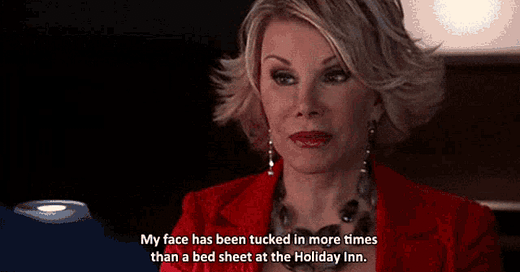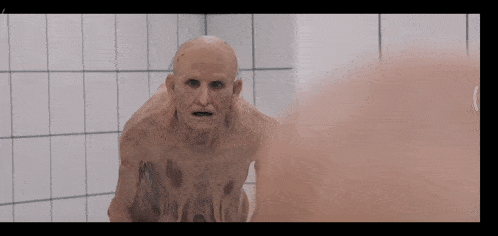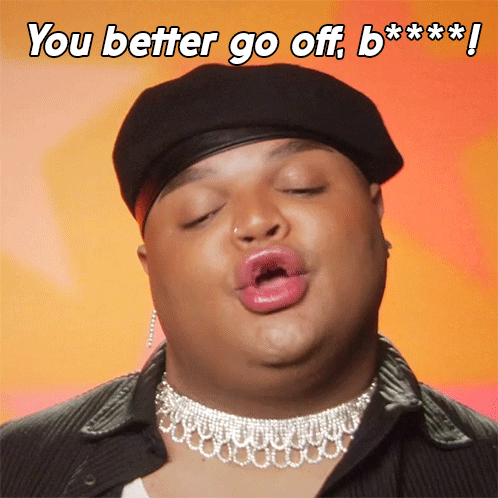I feel ok about my neck for now but am monitoring the situation
Wondering if there is baby Botox but for your faceneck
This article from NY Mag’s the Cut has been on my mind since I first saw it it, wherein a reader wrote in to ask if it’s good practice to start getting facelifts around age 45-50 and if doing it early is preventive. Three completely impartial New York plastic surgeons she consulted said it was.
This idea stirred up a reaction in me of “That’s messed up” plus “Tell me everything.” I’m 45 and accept my neck/jaw for what it is and what it will be (especially if I’m not looking at myself on a Zoom call.) Buuut, if there are new juniors-department neck/jaw procedures that fall between absolutely nothing and a facelift with incisions and anesthesia and everything, I want to know. For journalism.
I decided to talk ask my plastic surgeon friend and witch Sara Dickie to hear what’s up—are younger (while still older) women getting their faces snatched, is this somehow optimal to do earlier in middle age, and is there a way to do this that won’t leave you looking like Joan Rivers, RIP?
(This interview has been edited and condensed!)
I’ve been seeing articles lately suggesting that I might be considering a facelift at this age. That seems really early and extreme. What’s the story, for real?
The story for real is right around perimenopause, people start to see early jowls and bands or loose skin where their chin meets their neck, called the cervicomental angle. They can feel it. Everything feels loose. People come in and say, “I feel like my face is falling off my scalp.”
That starts to happen in the mid-40s, and that’s when people really first start to notice it. Whether it’s distressing enough that you want to do something about it that’s a different story.
In my opinion, there is really no good technology or cream or lotion. It is a surgical fix. The cosmetic industry is working very hard to find something that will fix these problems, jowling in the neck, loose skin in the neck. But there really just isn’t anything that compares to surgery.
When I think of a facelift, I think of old ladies who just get their faces pulled back.
The techniques have changed. The short facelift that came up in the ‘80s was a skin-only facelift. It would be making the same incisions we use now, around the ear, up into the temple or back into the hairline, and elevating with just a skin flap. We can get into the anatomy of the layers of the face, but basically, the skin sits on top of fat and muscle.
You raise this thin skin flap as far forward as you could go, almost up to the nasolabial fold. Then pull it back and cut out what was extra and sew it on. The issue with that is the skin flap being so thin, which is pulling on all of these deeper tissues that are part of the aging process as well and relying on the skin to hold everything.
This would create a windswept look where people were extremely over-pulled and then also the scars would tend to widen and be very noticeable. There were a lot of telltale signs.
In the early through mid-90s, surgeons started to define the deeper structures of the face, which were known for creating facial work. What ages you is loss of fat, dropping fat. You’re really changing your structure. By elevating or repositioning the deeper facial structures using the superficial musculoaponeurotic system (SMAS) [the thin layer of tissue that supports the skin and muscles of the face], that’s a much stronger layer, and you can position and secure that in a way that doesn’t pull everything really. It just shifts things back where they need to go. The skin is almost secondary. You use a much more limited skin dissection, and you put everything together underneath. Then you trim away the extra skin, and they scar together very neatly. You can glue it. It’s like there’s just no tension on it. It’s a much more natural appearing result.
Is it still called a facelift, or is that another name?
It is still called a facelift. I often see people calling it a facelift or a face and neck lift. To me, they’re all the same. I almost always address the neck when I’m doing a facelift.
I remember people would say about Botox, it’s good to start early and start light because it’s allegedly preventive. Is that the same when you begin to see a hint of jowl?
You could get a facelift as soon as you see jowling or a little bit of this bulk. But it’s a big surgery, it’s a lot of incisions. There are risks associated with it. The change you’re going to get is subtle. People will say, “You look refreshed.”
Whether you’re ready to undergo that amount of work for setting back the clock four years, five years, I don’t know that many people are ready to do that. You can. But will it stay that way forever? No. Things will continue to fall and settle.
One thing we don’t know as much about as we should is how much estrogen is affecting some of these changes. I would say that you see a dramatic change in facial aging around the 40s and 50s. Then it seems to me there’s another dip at 80.
But there’s no tiny little version of a facelift where you go to work the next day or whatever.
There have been many efforts to have a mini-something. MyEllevate basically pokes tiny holes and and there’s this instrument that goes underneath the skin and cuts the platysma muscle, and then you secure it with sutures. This is different than threads, but it is a modified thread lift, but you’re doing it blind. Then you cinch everything up. You don’t have much dissection, but you’re basically cutting the muscle bands and then pulling that tight and asking the skin to follow.
I have seen before and afters online, which I’m like, “Wow, that’s amazing.” But then I talked to my fellow practitioners and they’re like, “Yeah, I haven’t been able to get good results.” A very small percentage of people need it. The problem with things like that is when you have a hammer and people are asking to be a nail, you do it.
Let’s say you felt like you were getting slightly jowly. Not something that you’re like, “This is a big deal, but I see it creeping in.” Would your approach be just try not to look and wear a turtleneck and just carry on, or what would you do?
I see patients come to me and ask for things where I’m like, “I know what you’re talking about because I’m living it, but I don’t see it. I think you look fantastic. You look beautiful. Your skin health is good.”
Focus in on things with a little more bang for their buck, like skin health. Get a peel, start a retinol. Start doing some things that take a daily maintenance, invest in that. I try to do that same thing for myself.
Is face yoga anything?
I don’t think so.
I bought this lotion that claims to give you a more sculpted jawline. Does it do anything?
It moisturizes.
It doesn’t magically suction my jowl away?
No. Depending on the very specific person, sometimes with a little bit of jowling, you can hide the jowl by adding filler. But what you’re doing is you’re bringing the hollows in front and behind out to meet the jowl. You’re not tightening your jowl. You’re masking everything around it.
Doesn’t that make your face look more masculine?
You could look a little more masculine. Some people with very narrow faces or narrow jaws do great because it doesn’t square them out. You just build a little bit more of a jawline around that jowl. But people with already wide jawlines or some more square chins are going to look super square.
When you go to your plastic surgery conferences, what have you seen coming down the pipeline that you think would be the new thing, face or body-wise?
Renuvion uses heat-based energy, radio-frequency-based energy. Some people really like it for tightening the skin when they’re doing a tummy tuck liposuction. It’s weird because I have friends who have the machine and they’re swearing by it. I have other friends who got it done and are like, “I don’t see a big difference.”
It’s like if you get liposuction, you then use this thing and it adds heat energy to the skin. Scarring, in a sense. It tightens. Again, these are these devices that haven’t found the perfect usage and I think they’re overused, so, they have some poor outcomes. You don’t really know if they’re great or not and what they’re good for.
There’s this other thing called Ellacor. It’s fascinating. When you use a fractionated laser where you make little micro-injuries of the skin, then the stuff that you leave behind in between the grid of damage that you’ve done heals in those little areas of injury, creating collagen and tightening.
Those lasers only go 100 microns deep. The idea of Ellacor is you’re physically removing pores of skin. It’s like aerating a lawn. It’s a full thickness removal. so, like a tattoo gun with needles. But there are these little pores.
I’m imagining creating golf course holes.
Right, exactly. You do that through your whole face. Essentially you’re removing 15 to 20% of your skin, of your face. As it heals, it tightens.
That kind of sounds like a nightmare.
That is on market and it’s got a little buzz around it, but I don’t know if I believe it. They’re marketing as a facelift without surgery. But I’m like, if you’re not treating the skin, you’re just tightening the skin. It’s the same as a deep plane laser.
One thing I’ll say as a plastic surgeon is people come to me almost as if we have this hidden secret. If you ask the right question the right way, I’ll tell you what the fountain of youth is. The sad truth is we do not know.
The key to it is just realizing what other people see. People who’ve known you forever know your face. They’re not judging your face. They’re judging what is coming from behind your face. Certainly, if you do something that makes your face look better, people will be like, “Yeah, you look amazing. I’m so jealous.” But no one is like, “Let’s not go to dinner tonight. She’s got a wattle.”
I saw something online the other day that triggered an aha moment for me. A derm said, “There’s this thing called pretty person syndrome that is striking people in their 40s, 50s. It’s people that have always been the pretty one, the homecoming queen, who have been pretty their whole life, didn’t have to do very much to be pretty, who feel this intense pressure not to age and are at huge risk for overdoing things.”
Would you say the average middle-aged woman who doesn’t really love her incoming jowls, but it’s not something where she probably looks out of step with the rest of the world, should just do her best to feel her best and soldier on for now?
Exactly. You can do your best to feel your best.
End credits
Thanks for reading Evil Witches, a newsletter for people who happen to be mothers. New here? Here’s what the newsletter is all about.
If you have any questions, feedback, or suggestions for future issues, reply directly to this email or leave them in the comments. Our Instagram, curated by Carly O., lives here, and the Evil Witches archives live here. A random one from earlier this summer: loving your family, hating its shit, and where it all should go.
If you are not a paid subscriber, I hope you consider joining us:
Your subscription supports extremely vital service journalism like what you see today and gets you access to subscriber-only content, intimate, funny and helpful threads where we have candid, funny, sometimes hard discussions.
(And if you are a paid subscriber and missed it—it’s classifieds season!)
End credits
I recently read and loved “A Childhood” by Harry Crews. I particularly savored this recollection of how his mom reacted after he and his brother did a bad job looking after their infirm old grandma:








Wait wait wait, are you telling me that a lifetime of feeling like a swamp witch surrounded by Pretty People is finally paying off? Those years of high school where all of my friends were gorgeous and I wasn't, my time in college when I still couldn't figure out how to get shiny hair, my early 20s when I could never wear mascara on the ski slopes like Lindsey Vonn, marrying a man who thinks my face looks weird with makeup on, all of that is why I feel zero pressure to get any kind of Botox or plastic surgery at 40??? Hallelujah!
I found this to be really helpful and validating, and I appreciate your speaking with a female plastic surgeon for her perspective. Whether or not we like it, these are feelings and pressures that many of us confront on a daily basis, and it's nice to hear thoughtful and honest reflections on a topic that still feels (to me) shameful or taboo. When you mentioned "pretty person syndrome," it made me realize I'm dealing with a kind of "young person syndrome," where for my whole life, people commented on how young I looked. I hated it in my teens and 20s, of course, but it became a weird part of my identity, and now that I no longer look "young," it makes me feel like I'm missing something. I struggle with this more than I would like to admit. In any case, thank you for writing about this.